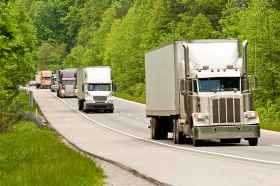Truck Policy ???
Topic 21656 | Page 1
Welcome Samuel.
I understand your concern but at the same time I'm not sure what you're expecting a company to say about you taking their truck home. Obviously they're not going to relieve you of any responsibility. They're not going to say it's OK to take their truck home and drive it into the river or use it for target practice.
What are you expecting the policy to be if they allow you to take their truck home?
Wasting my time at orientation isn't my idea of fun.
I doubt it was their idea of fun either.
Samuel, you are new here and I want to say welcome, but man are you getting off to a bad start in trucking. So you'd like to get a trucking job where a company is going to let you drive their $150,000 truck around yet not expect any personal responsibility from you to protect their asset?
This is a career that has big responsibilities. It requires responsible individuals who know how to get things done and can function at their highest level in challenging situations. All of this needs to be accomplished while getting along well with others. I have only a brief few statements of yours to make out your character but you kind of remind me of the gentleman who showed up at a trucking company orientation I was at who wore a T-shirt that boldly stated, "Doesnt play well with others." He went home just like you did over something he didn't like about it.
There is this whole mentality propagated among a lot of drivers these days that is constantly playing up this false idea that it is "us against them" or "them against us" when it comes to the relationship between drivers and trucking companies. Nothing could be further from the truth, but truth never seems to matter anymore. You sound as if you've played right into those ideas even before you've actually started your career.
I wish you the best, and I'll leave you with this advice. Push your personal reset button and restart your pursuit of this career. Do some reading in here and try again after you do. Here's some great places to start.
- Truck Driver's Career Guide
- Brett's Book: The Raw Truth About Trucking (free online version)
- High Road CDL Training Program
- CDL Practice Tests
CDL:
Commercial Driver's License (CDL)
A CDL is required to drive any of the following vehicles:
- Any combination of vehicles with a gross combined weight rating (GCWR) of 26,001 or more pounds, providing the gross vehicle weight rating (GVWR) of the vehicle being towed is in excess of 10,000 pounds.
- Any single vehicle with a GVWR of 26,001 or more pounds, or any such vehicle towing another not in excess of 10,000 pounds.
- Any vehicle, regardless of size, designed to transport 16 or more persons, including the driver.
- Any vehicle required by federal regulations to be placarded while transporting hazardous materials.
HOS:
Hours Of Service
HOS refers to the logbook hours of service regulations.You have to find a SAFE place to store your vehicle during hometime. If the vehicle gets damaged it IS your fault. I either park mine at our secure drop facility in the town I live or at the WalMart I used to work at. Where I park at the Walmart there is no less than 2 cameras overlooking it. If something were to happen, it would be recorded.
In this career you have to take responsibility for the choices you make. Including where you park your vehicle. For WEL to have you sign a statement agreeing to your culpability, they obviously have had issues in the past of drivers being irresponsible.
I’ve read this post 3 times to make sure I didn’t miss something. Correct me if I am wrong but I have always been under the impression anytime we have possession of a company’s equipment we are responsible no matter where we possess it at. So I guess either I have been wrong all along or have been misinformed. Just my way of looking at it

Basically, it is the wording that even if the truck doesn't start it's on me. All they needed was a simple clause in there such as "if we deem it the drivers fault" and it's okay. If I was assigned a different truck, for example, and something mechanical showed up after home time by the way they worded this policy it's coming out of my money. Being responsible to take care of the truck or watch over the truck is reasonable, and I understand this. It's just the legality of how everything was worded on paper. I asked another driver who has driven for years and he never heard of anything like it before as well as saying he would never sign it like that.
Welcome Samuel.
I understand your concern but at the same time I'm not sure what you're expecting a company to say about you taking their truck home. Obviously they're not going to relieve you of any responsibility. They're not going to say it's OK to take their truck home and drive it into the river or use it for target practice.
What are you expecting the policy to be if they allow you to take their truck home?
Basically the whole issue comes down to common sense. If I go home and leave stuff on draining the batteries, guess what that is on me. And yes I have done it. My common sense says get the battery charger out. Common sense also says if it goes dead because of bad batteries that’s on me to report to maint to get replaced. Too often people get too wrapped up in CYA type stuff and don’t employ old fashion common sense. I have serious doubts any reputable company would try and hang anything on a driver that was clearly not their fault. Our entire society has lost sight of common sense alot of the time and a certain select group of folks always seem to think everyone is out to get them. Guess I am old fashioned and too trusting
EPU:
Electric Auxiliary Power Units
Electric APUs have started gaining acceptance. These electric APUs use battery packs instead of the diesel engine on traditional APUs as a source of power. The APU's battery pack is charged when the truck is in motion. When the truck is idle, the stored energy in the battery pack is then used to power an air conditioner, heater, and other devices

Being someone outside the industry looking to this as a career change, I think this is something that every new driver should know about before making the first step. Obviously the company is concerned about their asset (the truck). If they allow you to take it home, they have an expectation that it would be returned to them in the same condition as when it left. If there are issues involving who's liable for anything that happens while you bring it/park it at home, you should know what they are not just for your own benefit but also from the perspective of the company who owns it.
So, is the solution to not bring a truck home and either live closer or just deal with the commute? Or is the solution to take as many reasonable precautions to make sure that nothing happens to it or the batteries don't get drained? If so, what would be your plan to deal with anything that could go wrong?
At CFI we take the truck and trailer home. It is our responsibility to find a safe place to park the truck and your dispatcher has to approve it. They tell us all the time that if the truck needs a jump start it comes out of our pocket. As drivers, it is part of our job to do a pre and or post trip inspection every day. At any time we find anything wrong with it we report it to the company and get it fixed. I usually go home for 6 days at a time. I turn off and unplug everything I can. I also start the truck and run it a bit every couple of days. I don't know what would happen if I had an accident or something happened to the truck.
Dispatcher:
Dispatcher, Fleet Manager, Driver Manager
The primary person a driver communicates with at his/her company. A dispatcher can play many roles, depending on the company's structure. Dispatchers may assign freight, file requests for home time, relay messages between the driver and management, inform customer service of any delays, change appointment times, and report information to the load planners.New Reply:
New! Check out our help videos for a better understanding of our forum features

















Preview:








 TT On Facebook
TT On Facebook
I'm wondering what most companies have as a truck policy. I was at WEL companies, Inc. orientation but left because their truck policy was worded to leave the driver wide open and responsible to pay for ANYTHING that happens while the truck is parked at the drivers house. They said to park at the terminal if you live within a 75 mile radius, but I lived too far to use this option. Anyway, I was told that this was only there if you took out a fence turning into your house or left the lights on, yet for some reason, WEL's lawyer worded it as they did leaving it with wide open responsibility to the driver. I asked other trucking people and had a hard time finding someone who would sign a paper like that.
So, my question is as follows: What other companies have a crazy truck policy like this?
I want to be able to avoid them like the plague. Wasting my time at orientation isn't my idea of fun.
Terminal:
A facility where trucking companies operate out of, or their "home base" if you will. A lot of major companies have multiple terminals around the country which usually consist of the main office building, a drop lot for trailers, and sometimes a repair shop and wash facilities.